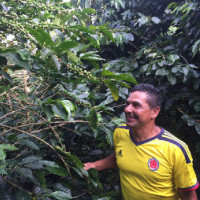Open Letter To President Juan Manuel Santos About Coca Eradication in Colombia CSOs across the globe express concern about forced eradication in Colombia
Regiones
Fecha de publicación:
In a letter to Colombian President Juan Manuel Santos, the International Drug Policy Consortium (IDPC), a global network of 177 NGOs, expresses strong support for the Peace Accord signed by the Colombian government and the FARC, while also expressing deep concern regarding intensified, and increasingly militarized, forced coca eradication efforts, especially in areas where communities have already signed crop substitution agreements.

Juan Manuel Santos Calderón
President of the Republic of Colombia Palacio de Nariño
Bogota, Colombia
18th August 2017
Dear President Santos,
The International Drug Policy Consortium (IDPC) is a global network of 177 NGOs that focus on issues related to illicit drug production, trafficking and use. IDPC promotes objective and open debate on the effectiveness, direction and content of drug policies at the national and international level, and supports evidence-based policies that are effective at reducing drug- related harm. Our global membership has expertise and experience on the wide spectrum of drug policy issues and we offer expert advice to policy makers and officials around the world.
We are writing today to express our strong support for the Peace Accord signed by your government and the FARC, which has raised genuine hopes for reducing the endemic human rights violations, violence and conflict in Colombia. Yet we also write to express our deep concern regarding intensified, and increasingly militarised, forced coca eradication efforts.
Point four of the accord on the ‘illicit drug problem’ recognises that poverty, social exclusion and violence are the driving forces behind the spread of coca cultivation across the country. Towards that end, agreements are being signed between local communities, individual families and the Programa Nacional Integral de Sustitución de Cultivos de Uso Ilícito, or PNIS, in which local growers agree to eliminate their coca in exchange for cash subsidies and government investment in technical assistance, infrastructure and other benefits. As organisations with drug policy expertise in numerous countries (and including what we have seen in past experiences in Colombia), we firmly believe that poor farmers who grow coca, poppy or cannabis should not be criminalised and that such cultivation can only be stemmed through sustained government support for equitable rural development.
We would also like to note that the 2016 UNGASS Outcome Document calls on governments to address the cultivation of prohibited plants through ‘comprehensive strategies aimed at alleviating poverty and strengthening the rule of law...and by promoting sustainable development aimed at enhancing the welfare of the affected and vulnerable population through licit alternatives’ (paragraph 7(a)).
For that reason, we are deeply troubled by the reports of forced eradication and violent confrontations between eradicators and the local population, especially in areas where communities have already signed crop substitution agreements. These actions not only perpetuate violence and generate new conflicts, but also undermine the very spirit of the voluntary crop substitution agreements and confidence-building efforts with local communities that have long been neglected – potentially threatening the effective implementation of the Peace Accord.
According to a report published on 15 August 2017 by the Observatorio de cultivos y cultivadores declarados ilícitos OCCDI Global-INDEPAZ, in June and July conflicts between eradication forces and rural populations took place in: El Retorno (the area of Inspección La Paz and its surrounding streets), San José del Fragua (Caquetá), Tibú (Norte de Santander), Piamonte (Cauca), Puerto Rico (Meta) and Policarpa (Nariño), among others (also see this recent civil society statement).
The Defensoría del Pueblo (Human Right’s Ombudsperson’s Office) expressed concern about this in a letter from 5 June 2017, pointing out that forced eradication efforts have led to ‘the breakdown of institutional trust, disruptions in efforts to promote dialogue and social protests’.
We understand that US government officials are strongly pressuring the Colombian government to meet coca eradication targets. However, the history of coca eradication in Colombia clearly shows that while such short-term reductions can be obtained through violence and force, they are not sustainable if the underlying conditions that lead to such cultivation are not effectively addressed. Building trust with marginalised rural communities, reducing poverty and violence, and constructing a stable and long-lasting peace should take priority. This requires room for manoeuvre with regard to the established targets and deadlines established by the PNIS, and enabling meaningful community participation to influence policy decisions that affect them.
We therefore respectfully request that you ensure that all Colombian government institutions, including the Ministry of Defense, respect the crop substitution agreements, support genuine dialogue with local communities to overcome difficulties in their implementation, and cease forced eradication in areas where such agreements have been signed or are being negotiated.

